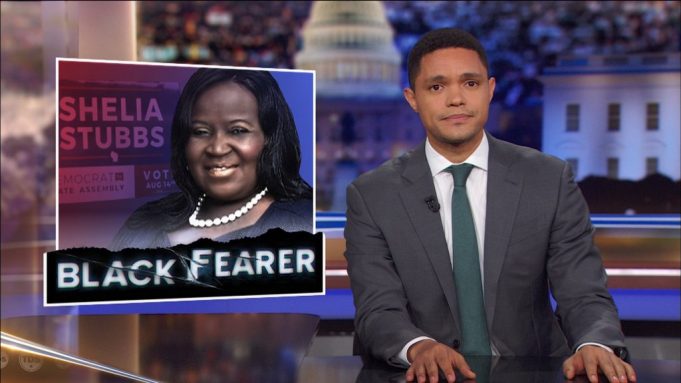“They are waiting for drugs at the local drug house — would like them moved along.”
That’s how a Madison man in a predominantly white neighborhood described future Wisconsin state assemblywoman Shelia Stubbs, along with her 71-year-old mother and 8-year-old daughter, as she did what she has now been doing for 13 years in Madison – walking door-to-door in the neighborhood to talk about issues with Madisonians.
Stubbs was stopped and questioned by the police, in front of her daughter, mother and the whole neighborhood, during a humiliating incident that happened back on Aug. 7 when the aforementioned Madison citizen reported her “suspicious vehicle” in a 911 call. The unfortunate event was first reported by Jessie Opoien in The Capital Times last Wednesday, but quickly went on to make national news in a host of news outlets as the very latest example – #campaigningwhileblack – of black people being reported to the police for doing lawful everyday activities.
“My initial interview was with CBS Evening News and I’ve been on RT America, Chatter TV. I’ve been interviewed by the New York Times. I’ve been interviewed by CNN and featured on the Daily Show with Trevor Noah. I’ve been in Essence Magazine, Newsweek. It’s been a whirlwind couple of days,” Stubbs tells Madison365.
Was Stubbs nervous to go on national TV?
“Yes, very much so. I’ve never been in the national spotlight that way,” Stubbs says. “I didn’t quite know what to expect but I just wanted to be true to my story about what happened to me. I hope that it was demonstrated through that interview. I wanted others to see through my lens what it felt like that day for myself and my family.”
On that initial CBS Evening News interview (above), Stubbs had a message for her racial profiling caller: “I want them to see that I made it,” she said. “I am now your representative.”

In the August election, Stubbs won the primary with nearly 50 percent of the vote. Since she will be running unopposed in the Nov. 6 general election, she is set to become the first African-American woman to represent District 77 in the Wisconsin State Assembly.
“I’m thankful for the constituents of District 77 for believing in me and knowing that I will be a fighter for bold and effective changes,” Stubbs says. “I’m thankful for them for believing in me and giving me this awesome opportunity to represent them.”
Stubbs has worked on issues of racial equality for most of her life, often fighting on the behalf of others who have faced racial prejudice and discrimination. She emphasizes that this particular racial profiling issue that happened to her could happen to anybody anywhere.
“I think that it brings forward a conversation about racial profiling and racial injustice that oftentimes people don’t think exists and they think would never happen in Madison, Wisconsin,” she says. “The Race to Equity report raised some awareness, but still people have their doubts. I hope me coming forward with my story and sharing it with people lets people know that racism is still alive in this city and this country.
“There are people in Madison that didn’t believe that racial disparities existed in Madison. There are really people who are blind to this conversation,” she continues. “They don’t want to accept it. But it’s reality. It exists. And now people are understanding that it does. And they are saying, ‘That’s enough.’”
For Stubbs, the incident was traumatic for her but it was especially tough for her mom and daughter who were with her when the racial profiling happened.
Stubbs’ mother, 71-year-old Linda Hoskins, grew up in heavily segregated ’50s and ’60s Jim Crow Arkansas, where overt acts of racism were pretty commonplace.
“She was really upset about all of this,” Stubbs says. “My mom has seen a lot as an activist and living through the Civil Rights struggle. She was really troubled by the whole thing.”
Worse was the experience of Stubbs’ eight-year-old daughter who was right there in the car when the police came to question mom.

“‘Mama, why don’t we belong here?’ she asked me. Looking at this through the eyes of an eight-year-old was really sad,” Stubbs says. “I couldn’t be me in front of my constituents, in front of police officers, in front of my mom, in front of my daughter. It made it worse. My family – mentally and physically – we were in a bad place for awhile after that.”
Stubbs took a day off from canvasing, even though it was less than a week before a very hotly contested election and she really needed to get out to doors.
“After it happened, I couldn’t even get out of my bed. I was crying that much. I just weeped and weeped and weeped and tried really hard not to do it in front of my daughter,” Stubbs remembers. “They thought we were drug dealers. My daughter didn’t even know the word ‘drug dealer.’ So, she got exposed to something I never talked to her about.
“I have had a lot of great support through this ordeal. I am very grateful. I’ve heard people tell me that they cried when they heard this story and they felt my pain and they want to know what they can do,” Stubbs continues. “They’ve asked me over and over, ‘How is your daughter doing?’ Because people that really deal with reality understand that there is hurt. There is that pain.
“From all of this, I made a promise to my daughter to work on this. I told her, ‘Mommy is doing this so I can make it better for you and other people,'” Stubbs adds. “I want to take on challenges today so this world will be better for them. I want to say to my daughter, ‘What I went through, I’m not going to have you go through the same thing.’ That was important to me as a mom.”




























